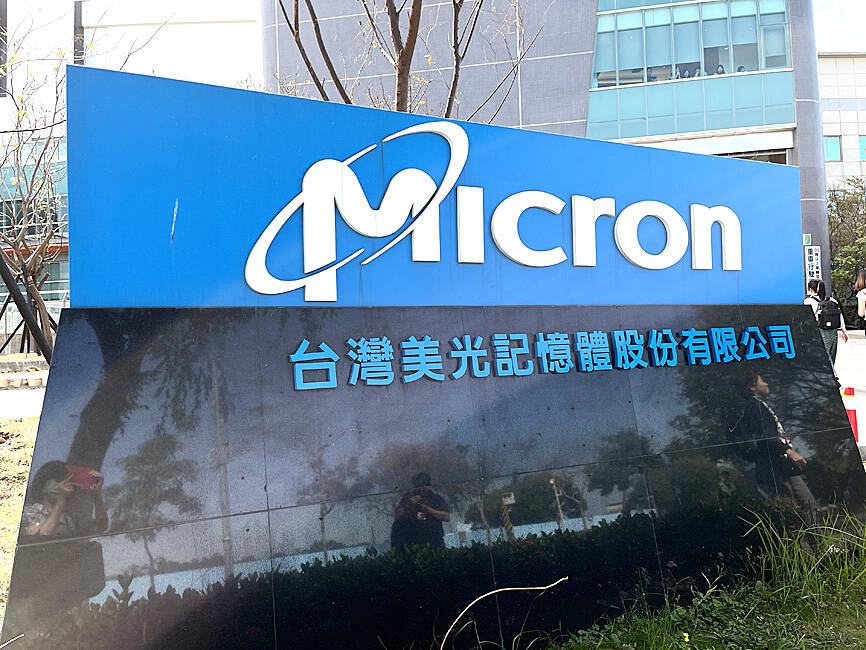Micron Technology Inc has reportedly set its sights on two facilities owned by flat-panel maker AUO Corp (友達) after Taiwan Semiconductor Manufacturing Co (TSMC, 台積電) recently clinched a deal to buy a facility and equipment from Innolux Corp (群創), another major flat-panel maker.
Micron, the world’s third-largest memorychip maker, is expected to purchase two AUO plants in Tainan to expand its advanced chip packaging and testing services and high-bandwidth memory production, local media reports said.
The two plants were shut down in August last year and AUO is seeking to dispose of the facilities, the reports said.

Photo: Grace Hung, Taipei Times
They are expected to cost Micron NT$10 billion to NT$20 billion (US$314.3 million to US$628.6 million), according to market estimates.
AUO declined to comment on the reports, only saying that it has adjusted production at its complex in Tainan and would optimize use of its facilities.
The deal between TSMC and Innolux was announced on Aug. 15, with TSMC agreeing to pay NT$17.14 billion for Innolux’s 5.5th-generation plant in the Southern Taiwan Science Park (南部科學園區) and equipment to help meet its needs for day-to-day operations.
The purchase would help expand TSMC’s advanced 3D chip-on-wafer-on-substrate (CoWoS) packaging capacity for artificial intelligence chips, analysts said.
In addition to CoWoS, TSMC said it is developing fan-out panel level packaging (FOPLP) chip packaging technology, which is more advanced than standard wafer-level packaging.
Analysts said they would not rule out TSMC teaming up with Innolux to develop FOPLP technology, citing industrial sources as saying that the two companies’ research and development teams have met.
Innolux said it expects to make a profit of about NT$14.7 billion from the sale to TSMC.
Analysts estimated that the transaction would boost Innolux’s earnings per share by NT$1.62 this year.
Separately, Innolux has reduced its paid-in capital by NT$10.8 billion, or 12 percent, by canceling about 1.089 billion shares and giving NT$1.2 in cash per share to shareholders.

Anna Bhobho, a 31-year-old housewife from rural Zimbabwe, was once a silent observer in her home, excluded from financial and family decisionmaking in the deeply patriarchal society. Today, she is a driver of change in her village, thanks to an electric tricycle she owns. In many parts of rural sub-Saharan Africa, women have long been excluded from mainstream economic activities such as operating public transportation. However, three-wheelers powered by green energy are reversing that trend, offering financial opportunities and a newfound sense of importance. “My husband now looks up to me to take care of a large chunk of expenses,

SECTOR LEADER: TSMC can increase capacity by as much as 20 percent or more in the advanced node part of the foundry market by 2030, an analyst said Taiwan Semiconductor Manufacturing Co (TSMC, 台積電) is expected to lead its peers in the advanced 2-nanometer process technology, despite competition from Samsung Electronics Co and Intel Corp, TrendForce Corp analyst Joanne Chiao (喬安) said. TSMC’s sophisticated products and its large production scale are expected to allow the company to continue dominating the global 2-nanometer process market this year, Chiao said. The world’s largest contract chipmaker is scheduled to begin mass production of chips made on the 2-nanometer process in its Hsinchu fab in the second half of this year. It would also hold a ceremony on Monday next week to

TECH CLUSTER: The US company’s new office is in the Shalun Smart Green Energy Science City, a new AI industry base and cybersecurity hub in southern Taiwan US chip designer Advanced Micro Devices Inc (AMD) yesterday launched an office in Tainan’s Gueiren District (歸仁), marking a significant milestone in the development of southern Taiwan’s artificial intelligence (AI) industry, the Tainan City Government said in a statement. AMD Taiwan general manager Vincent Chern (陳民皓) presided over the opening ceremony for the company’s new office at the Shalun Smart Green Energy Science City (沙崙智慧綠能科學城), a new AI industry base and cybersecurity hub in southern Taiwan. Facilities in the new office include an information processing center, and a research and development (R&D) center, the Tainan Economic Development Bureau said. The Ministry

State-run CPC Corp, Taiwan (CPC, 台灣中油) yesterday signed a letter of intent with Alaska Gasline Development Corp (AGDC), expressing an interest to buy liquefied natural gas (LNG) and invest in the latter’s Alaska LNG project, the Ministry of Economic Affairs said in a statement. Under the agreement, CPC is to participate in the project’s upstream gas investment to secure stable energy resources for Taiwan, the ministry said. The Alaska LNG project is jointly promoted by AGDC and major developer Glenfarne Group LLC, as Alaska plans to export up to 20 million tonnes of LNG annually from 2031. It involves constructing an 1,290km